Everyday racism: Breaking cycling's other glass ceiling
Why are Black riders so under-represented in the pro peloton?
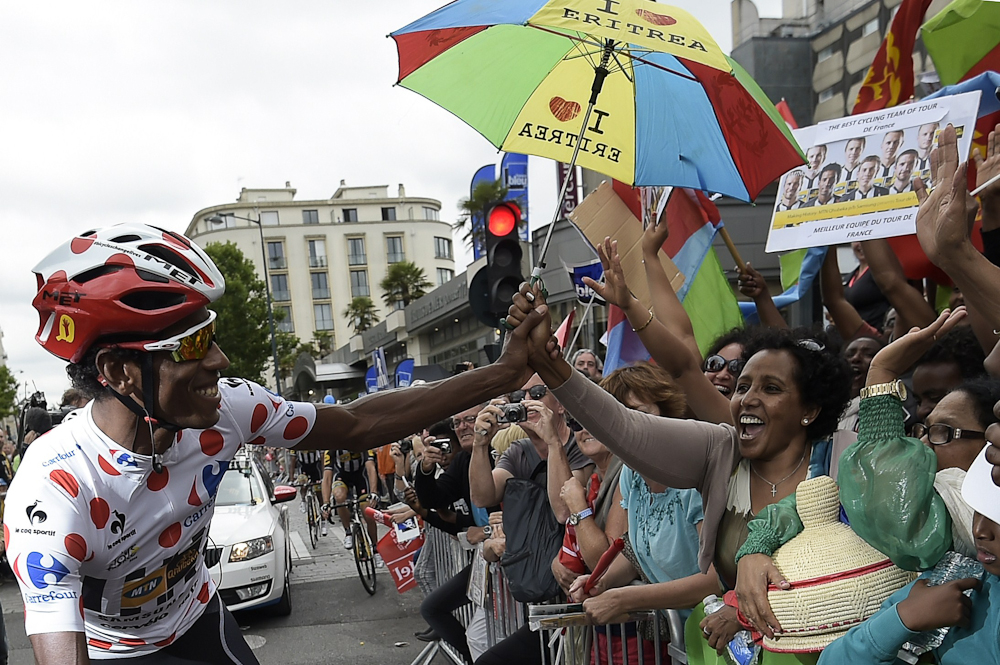
Major Taylor was the first African American to win a cycling world title and the second Black athlete to be crowned world champion in any sport way back in 1899. While the world has supposedly become more progressive since then and most major league sports have become more diverse – the NBA and NFL are majority Black players – road cycling has remained very, very white. Why?
As the world reflects on race, societal power structures, and attitudes that perpetuate bigotry and racism in the wake of the police killing of George Floyd, the insular world of professional cycling can no longer ignore the issues at hand.
There has been a steady influx of South and Central Americans, Asians, Africans and Middle Easterners in the professional peloton, but there are only five Black riders in the WorldTour and five in the Pro Continental ranks - none American - and the number has decreased in recent years.
Though you can argue the development structures are not as well established in those nations, the same cannot be said for the so called 'land of opportunity'. And yet, there are no African American riders in any of the seven US Continental teams and none on any ProTeam, WorldTeam or Women's WorldTeam.
The numbers are quite stark: there are 113 US riders are licensed on professional teams but zero of them are Black. Looking back over recent road history, you can count the number of African Americans who've had even a remote shot at the WorldTour or the sport's top level on one hand.
The question of why there are so few Black riders in the professional peloton is a complex one and each rider's experiences and views are different. It's not a simple as multiple overtly racially biased incidents making for a hostile environment. The barriers exist at every level, in every country and throughout society.
Cyclingnews reached out to two African American riders who've made it to Europe – Rahsaan Bahati and Erik Saunders – to hear their stories and highlight what is keeping more Black riders from progressing through to the sport's top level.
The latest race content, interviews, features, reviews and expert buying guides, direct to your inbox!
Everyday racism
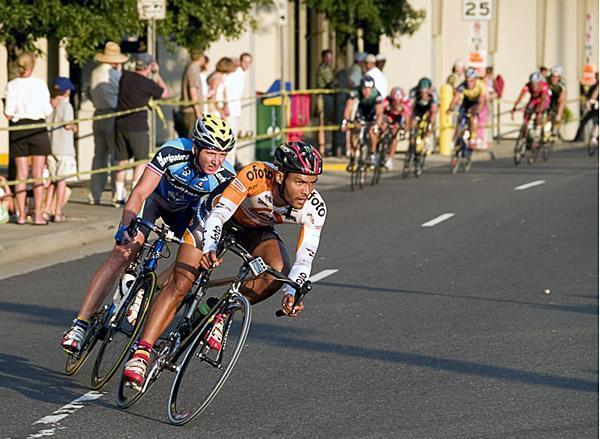
Saunders, 45, came up through the junior ranks after switching from mountain biking to road. Unlike most riders, who have a dream of racing in Europe and go through the national developmental programs to get there, Saunders forged his own path.
After attending Virginia Commonwealth University and making his name in the regional and national racing scene, he made his way to Europe through personal contacts rather than relying on the USA national team. He raced with the Vendée U team in 1999 and 2000 and the Swiss Ficonseils team in 2001 before returning to the US to race for various Continental squads in the 2000s.
As Saunders described his experiences to Cyclingnews, he talked a lot about race as a construct created by those in power and used, along with gender and class, to control people and put them in 'boxes', adding that anyone taking up cycling in the US becomes an outsider because it's a fringe sport.
"You know you won't fit in, and I never wanted to fit in," Saunders says. "Even in the Black community getting on a bike puts you on the other side of the fence. They worried about my safety, they thought I was strange. To some people it's cool but it bothers some people. I always knew I wanted to race but I knew it was out of the box, so I expected to not fit in."
That said, racism and bigotry absolutely were factors in his career.
"One hundred per cent, things went certain ways because I wasn't taken seriously as a cyclist because of my race," Saunders says, "because of ideas that others had about me. How big a factor was it? I don't know – it's as if it's one of the letters that spell the word factor. Racism isn't isolated to cycling – it's intertwined in life – every single day, racism."
Saunders developed his expectations for the sport as he went along – his coping mechanism was to embrace the role of the outsider rather than try to fit in. He chose to make his own way because he felt like the national team coaches looked at him and assumed he would be a certain way because of his race.
"I didn't look like all the riders they had success with in the past," he says, adding that when he didn't test well after a long, hard season of racing it confirmed their assumptions but when he did well in drills on the road, they seemed surprised.
"Certain people weren't ever going to get a look by the national team, or you'd have to keep trying and trying to really stand out. I wasn't interested in playing that game," he says.
Both Saunders and Bahati say the racism in the US feels different to that in Europe – that in Europe there are other factors like bias against those who don't speak the language or are from different regions of, for example, the French-speaking world. But Saunders said in the US he's had riders race specifically against him because they didn't want to see a Black rider win.
That and other micro-aggressions put a glass ceiling over riders of colour that Saunders compares with doping in the EPO era - where racing clean meant a fruitless struggle to succeed, where riders could only climb so high.
"It's like doping in that it changes the result, and you'll never know what was true or false, what could have been - you know it makes your job harder and you accept that ceiling. In a racist society it means that you have to make the same kind of calculation as with doping.
"I accepted that others may place a ceiling on me. But in the end that had nothing to do with why I was there racing. I accept that I cant always influence the actions of others and so I had my own goals and didn't expect anything from anyone. So when I didn't get everything others got it wasn't important, it wasn't stopping me from enjoying myself, but of course I know I was treated differently."
Insider/Outsider
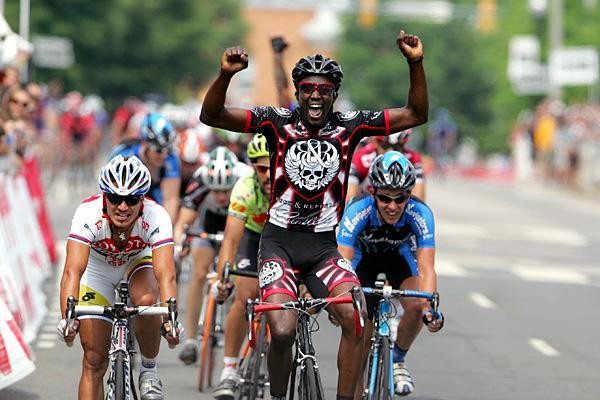
While Saunders never expected to feel accepted, for Bahati, the experience felt different. He wanted to race in Europe and wanted to feel a part of the established cycling world but struggled to find acceptance.
Bahati is possibly the one African American rider who came the closest to the WorldTour. In 2006, Bahati signed with Jonathan Vaughters' TIAA-CREF squad and came agonisingly close to a European career but - like many white riders - it didn't work out.
His feelings of being an outsider started when, as a junior in 2000 he won numerous races including the elite criterium national championship at 17 against riders much older and more experienced, but even that wasn't enough to convince USA Cycling (then USCF) to include him on the national team for the world championships.
"They told me I had to win the junior road race at Nationals if I wanted to be selected for Worlds. I had been winning races all year, but I have to win? I won the race solo, but what if I had gotten second?" Bahati remembers.
Bahati's U23 career was cut short when he went to college at Indiana University, but a top 10 in the Wachovia Classic against a slew of top riders earned him his shot with Vaughters' TIAA-CREF team in 2006.
The learning curve was steep. The team tasked Allen Lim with training him but Bahati struggled with the workload. He remembers his teammate Mike Creed encouraging him, telling him 'it's the only way' - but in his first stint in Europe, he didn't make the cut.
He remembers overhearing the team's directeur sportif saying something like 'he's not worth it' and it knocked the wind out of him.
"At the time I thought I should have had equal opportunity to progress but it was one shot, you miss, you're done. Others had multiple shots," Bahati says. "When you see it first hand, there's no other way to look at it unless you're in denial. Why did you give up on me so quickly? You knew what I was capable of ... it still bothers me. My dream was to race in Europe and I didn't get that opportunity."
He came home and trained, won a stage at the Tour of the Gila and refocused on trying to get into the Tour of California but again, he missed the cut.
"The selection came down to who could do X watts for X minutes. Cycling is all about the numbers," he says, admitting, "I don't test well but I race well. Numbers don't make you a good bike racer. It would have been good for the sport, for Tour of California, for the Black community, for the team - but I missed out."
All of the missed opportunities, he says, are bigger issues for Black riders than for their white counterparts.
"There are a smaller number of Black riders racing bikes. If John Smith isn't selected for the team, his race is still represented. But if you isolate it to us, we're a small number, now you can see the impact to a whole generation of Black cyclists," he says.
His fellow Californians Justin and Cory Williams have echoed that sense of isolation felt among a mostly white peloton.
"The transition from [growing up in Los Angeles] to the US national team and being the only person of colour there was crazy. Being involved in a primarily white sport it was hard not to feel alone, and it ultimately cracked me," Williams said in a 2019 interview.
Cory Williams said on Instagram last week: "I've struggled in my career. I've been one of the top cyclists in America even the best at my age at one point. I've been national champion, won a stage race overall, won a green jersey, won over 20 state championships and been top 20 at national road races as a junior and never been able to represent America on the national team."
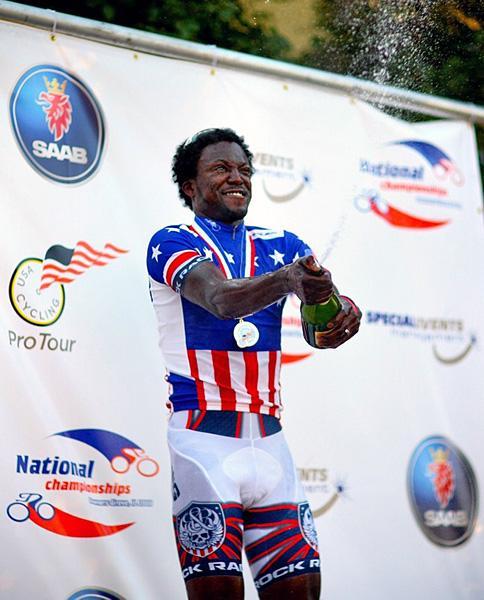
Vaughters responds
Cyclingnews reached out to Vaughters regarding Bahati's suggestion that he was not given a fair chance, and Vaughters admitted that cycling needs to do better.
"The sport of cycling needs to do a much better job when it comes to ensuring Black athletes are better represented, period. We absolutely have to do better," Vaughters said in an email.
"On the matter of Rahsaan's time with us, I regret that his time on the team didn't come sooner. We were much more of a development-focused team in the 2004 and 2005 seasons, and we prioritized preparing riders for the jump to the top level of the sport. By the time we signed Rashaan in 2006, we were so focused on making it to the Tour de France ourselves that many of our riders were on short-term deals and we weren't giving most of those riders – Rahsaan included – enough time to develop.
"Rahsaan was a true talent, and he had the ability to develop into a great sprinter. We spent time on the coaching and training elements, but I should have been more cognizant of the fact that Rahsaan was coming into a very white sport. In nearly every European race Rahsaan competed in, he was the only Black rider. I'm sure that was incredibly alienating, and I wish I had done more to improve his time with the team."
Vaughters highlighted the failures of development structures from the junior level on up.
"Fundamentally, there is a lack of opportunity, mentorship, and coaching that's available early on for Black riders that's foundational. That's an issue we as a community and industry need to solve so that by the time those athletes are at the WorldTour level they are positioned to succeed. We need to start by listening to athletes like Rahsaan, first and foremost. As a sport, we have much work to do."
USA Cycling responds
USA Cycling's CEO Rob De Martini says the development model is broken and does not reach deep enough into the potential pool of talent in the country.
"There tends to be a common entry for young riders to come into cycling - typically it's from another sport that they've skilled, injured or bored out of. They have a family member or friend who introduced them to cycling," De Martini says - but with minorities already underrepresented it will take a more concerted effort.
USA Cycling is focussed on getting more youth from diverse backgrounds into the sport through programmes like Outride and learning from successful grassroots groups like Black Girls Do Ride.
"We are committed to finding ways to make cycling look more like the population of the United States but we're a long way from that," De Martini says.
"We shouldn't be out there measuring sock height, we should be asking how we can get more kids to see cycling as a sport that they can do."
He says that in his year with the organisation, they've created a Diversity, Equity and Inclusion committee to address gender and transgender issues and have broadened it to include all underrepresented groups with the aim of having a more diverse team for the next Olympic cycling, in particular for the 2028 Summer Games in Los Angeles.
Before COVID-19 led to the cancellation of all mass-participation events, USA Cycling had cut its membership fees in half and introduced a family membership where two adults and any number of their children can be members for $60 per year.
The USA team for the 2021 Tokyo Olympics is not a diverse one, but De Martini says, "We can't fix the past but we can work for positive changes going forward."
Looking toward the future
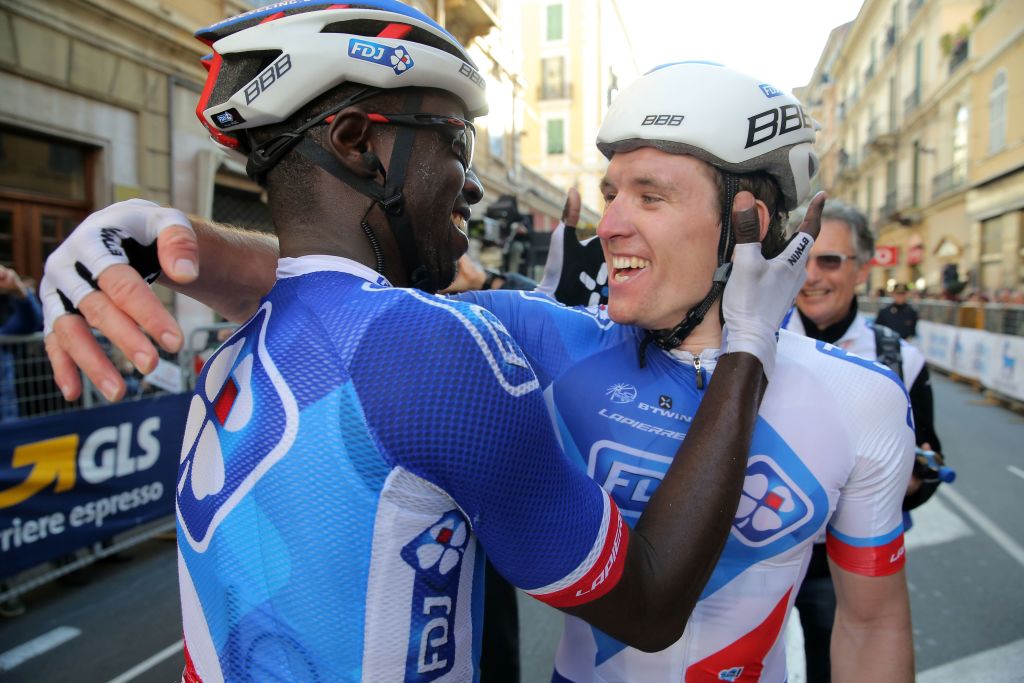
Saunders compares racism's effects to the effects that doping had on clean riders in the 1990s - but unlike doping, it's impossible to address the problem without larger societal changes of race, gender and class.
Fixing the issue of racism in cycling means listening to what riders are saying, challenging one's own preconceptions, and questioning the power structures in the sport.
Saunders challenges people to ask why the concept of race exists and why a Black cyclist seems so different.
"When African riders started to compete in the Tour de France it was shocking to people. When you see a black man on a bike there are different kinds of reactions - it's a novelty (at best) or it's a sign of something that's coming, something that threatens their position. People see you where they think you don't belong and they ask, 'what's the agenda?'.
"Being seen either as a novelty or a threat, either way it's demeaning..."
There may be no good answers on how to make cycling more diverse until the larger societal structures shift, but Saunders said he has some regrets about not speaking out more strongly during his career. He said the inevitable blowback is frustrating and draining.
"But you need to listen and believe the experiences [of Black riders]."
Saunders now runs his own business manufacturing socks and mudguards called Memory Pilot, while Bahati and Cory and Justin Williams have created their own safe place for themselves and other like-minded riders in Los Angeles.
Bahati created the Bahati Foundation to get more inner-city youth on bikes. The Williams brothers created the L39ion of Los Angeles team, a veritable wrecking crew that dominate every race they enter. They recently raised over $80,000 to help fund the L39ion team and they plan to support junior programs and riders with equipment needs, revamping the Major Motion junior team named after Major Taylor.
Bahati says that getting Black riders into the pro peloton means more than just 'hey, put me in the race'. "One hundred per cent you have to have the goods, but I didn't get a fair chance. It could change the monetary future of your family who weren't in a position to own real estate, to buy stocks. It's another generation fighting for their lives," Bahati says.
"It's not enough to be represented in paid media and ads. It's not genuine, it's just a checked box - there is no longevity."
Bahati says the industry should open its hiring practices and have more diversity up through the executive level.
Saunders wants people to question what they believe about pro cycling. "People think it's a waste of time to look at cycling in South America or Africa because European cycling is already the best - the flow of thought is coloured by that idea," he says, encouraging people to challenge what narrative led to those beliefs.
Both he and Saunders agree the power structure needs to change.
"Cycling needs to come together. There needs to be leadership. We never had to be vocal because it never touched home. Now it's worldwide. It's time for companies to take a stance and say, 'this is what we represent'."
Resources
Major Taylor Association - Educational resources about Major Taylor including a list of associated clubs (note, slightly outdated).
Black Girls Do Bike (USA) - Their motto is "It's like a pep rally for black girls on bikes". A group of cycling clubs and chapters across the United States creating a welcoming and comfortable place to introduce the joy of cycling to all women, but especially women and girls of color. Find your local chapter.
Black Cyclists Network (UK) - a private Strava club: "Our aim is to connect cyclists from Black and Minority Ethnic (BAME) background. We also want to use our platform to encourage people of colour to take up cycling. We are a majority BAME club, But don't let that put you off. We are an inclusive group. We welcome supporters and members from all backgrounds who share our vision".
We Bike NYC - WE Bike NYC is a group based in New York City open to all women, female identifying, and gender nonconforming people who enjoy biking (or think they might). WE Bike NYC aims to break down barriers to cycling and build community by offering FREE social rides, training rides, and educational workshops. WE Bike because it’s a great way to get around New York, it’s healthy and it’s FUN!
Reading
The unbearable whiteness of cycling
15 Influential Black Cyclists You Need to Follow on Instagram Today
Anti-Racism Resources for White People - An exhaustive list of anti-racism media including movies to watch, essays to read, and people to follow to further educate yourself.

Laura Weislo has been with Cyclingnews since 2006 after making a switch from a career in science. As Managing Editor, she coordinates coverage for North American events and global news. As former elite-level road racer who dabbled in cyclo-cross and track, Laura has a passion for all three disciplines. When not working she likes to go camping and explore lesser traveled roads, paths and gravel tracks. Laura specialises in covering doping, anti-doping, UCI governance and performing data analysis.